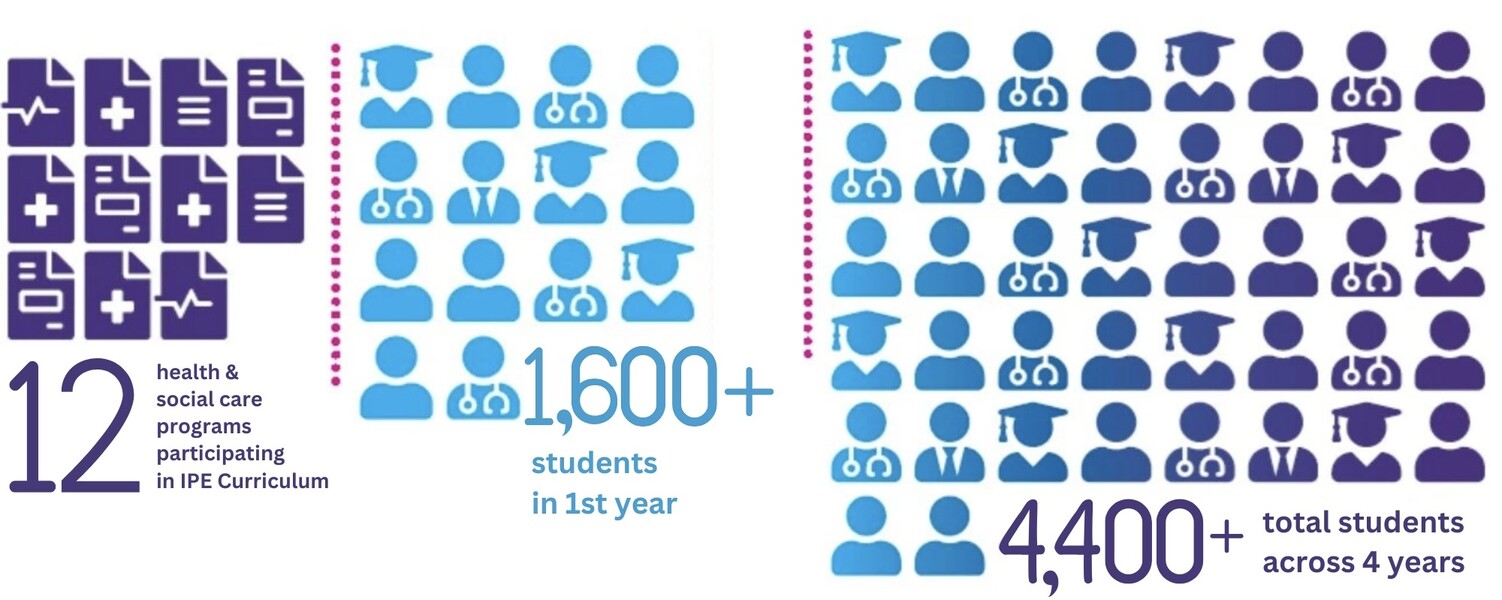
Main Second Level Navigation
Breadcrumbs
- Home
- Curriculum
- Curriculum
U of T IPE Curriculum
Passionate Purpose
A continuously co-created, integrated, evidence-informed, interprofessional education curriculum that prepares health and social care learners for collaborative practice and system transformation.

Curriculum Overview
Each year we welcome approximately 1600 students from 12 health and social care programs and counting. The programs range in length from 2 years to 4 years. There are approximately 4400 students involved in the UofT IPE Curriculum at a time.
Through continued collaboration and engagement between the Centre for Advancing Collaborative Healthcare & Education (CACHE), faculty at the University of Toronto and practice partners, all health professional students have the opportunity to develop collaborative competencies (CIHC 2024) through the integrated developmental Interprofessional Education Curriculum in both the university and practice settings.
Over the course of the curriculum, students engage in up to nine foundational learning activities: Why Collaborative Healthcare? Learning from stories and science, Who do we collaborate with? Valuing what we do and challenging what we think, Cultivating Team Partnerships: Learning from Lived Experiences, Faculty-Led Learning Activity, Collaborating for Quality, Conflict in Interprofessional Life, Case-Based Learning Activity: Pain Curriculum, Palliative Care and/or Appreciating Roles and Collaboration to Improve Care: Head and Neck Cancer Case, and IPE Component in a Practice Setting. Additionally, students complete a minimum number of approved elective learning activities according to their program requirements. Electives, facilitated by university and clinical faculty, are held on campus and in many practice settings and include interactive sessions, simulations, patient/client/family stories, clinical team-led cases and discussion, student team-based activities, community clinic engagement, as well as facilitated blended learning activities.
Pedagogic approaches vary, striving to achieve an efficient, interactive and engaging curriculum that is designed to prepare collaborative-practice ready health professionals. Faculty and trained client/patient/family educators engage with students to ensure authenticity of curricular offerings. Students who have completed a facilitator education program develop leadership skills in small group facilitation and curriculum development. Trained client/patient/family educators facilitate learning and collaborate with faculty to contribute to curriculum development. Additionally, technology-enabled learning opportunities support collaborative learning in virtual formats.
IPE Curriculum Evaluation and Learning Framework
The purpose of the UofT IPE Curriculum evaluation and learning framework is to support CACHE inclusive of all partner groups (e.g., IFCC, IPEL), to gather credible and relevant information in a structured way to inform decision-making at both the activity and curriculum levels. Additionally, this framework will serve to embed the passionate purpose within the curriculum structure.
An evaluation framework is “both a planning process and a written product designed to provide guidance to the conduct of monitoring, evaluation [and learning] functions over the lifespan of a program or other initiative”(Markiewicz & Patrick, 2016, p. 1). An evaluation framework helps to establish and make transparent program processes and results, inform decision-making, support accountability, and guide program and organizational learning for improvement.
As a living document, an evaluation framework is not static, but rather a tool that evolves and changes over time based on new information, insights, and the ongoing processes of program implementation and evaluation. This approach ensures the framework remains relevant and effective as programs learn and develop..
This document provides an overview of the processes used to develop the first version of the UofT IPE Curriculum evaluation and learning framework and its associated products.
This work was led by Ashleigh Townley for her capstone project in the Master of Evaluation program, University of Melbourne, under the supervision of Dr. Kathryn Parker (Associate Director, Transformative Change & Evaluation).
Download the IPE Curriculum Evaluation Framework here.
Any delivery of activities part of the IPE Curriculum is evaluated for Quality Improvement (QI) purposes. This may include foundational or elective activity sessions, in-person or virtual, IPE Curriculum programs and initiatives such as the Health Arts Humanities Certificate Program, Senior Interprofessional Design Projects, Student-Led Experiences, or more. Please note that any foundational or elective IPE Curriculum activities may be observed and recorded (with fieldnotes) and the standard post-activity survey analyzed in order to continually evaluate the IPE Curriculum for QI purposes. QI of the IPE Curriculum will not affect your current or future affiliation or standing with UofT or healthcare organizations. There is no identifying information collected and data will only ever be presented in aggregate form.